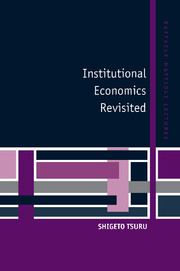Book contents
- Frontmatter
- Contents
- Preface
- Institutional Economics Revisited
- CHAPTER ONE Reappraisal of Marxian Political Economy as ‘Institutionalism’ in the Broad sense of the Term
- CHAPTER TWO The Methodology of Aggregates: Keynes vs. Marx
- CHAPTER THREE Marx vs. Schumpeter on Business Cycles
- CHAPTER FOUR Institutional Economics in America: Veblen
- CHAPTER FIVE Modern Institutionalism
- CHAPTER SIX The Future of Institutional Economics I: In Place of GNP
- CHAPTER SEVEN The Future of Institutional Economics II: The Mixed Economy as a Mode of Production
- DISCUSSION, AND COMMENTS, BY SHIGETO TSURU
- BIOGRAPHY OF SHIGETO TSURU
- References
- Index
CHAPTER ONE - Reappraisal of Marxian Political Economy as ‘Institutionalism’ in the Broad sense of the Term
Published online by Cambridge University Press: 13 May 2010
- Frontmatter
- Contents
- Preface
- Institutional Economics Revisited
- CHAPTER ONE Reappraisal of Marxian Political Economy as ‘Institutionalism’ in the Broad sense of the Term
- CHAPTER TWO The Methodology of Aggregates: Keynes vs. Marx
- CHAPTER THREE Marx vs. Schumpeter on Business Cycles
- CHAPTER FOUR Institutional Economics in America: Veblen
- CHAPTER FIVE Modern Institutionalism
- CHAPTER SIX The Future of Institutional Economics I: In Place of GNP
- CHAPTER SEVEN The Future of Institutional Economics II: The Mixed Economy as a Mode of Production
- DISCUSSION, AND COMMENTS, BY SHIGETO TSURU
- BIOGRAPHY OF SHIGETO TSURU
- References
- Index
Summary
Most characteristic of Marx's methodology in political economy is the emphasis on the importance of distinguishing between, and integrating, the real and the value aspects of the social production process. He wrote, for example:
The labor process … is human action with a view to the production of use-values, appropriation of natural substances to human requirements; it is the necessary condition for effecting exchange of matter between man and Nature; it is the everlasting Nature-imposed condition of human existence, and therefore is independent of every social phase of the existence, or rather, is common to every such phase … As the taste of the porridge does not tell you who grew the oats, no more does this simple process tell you of itself what are the social conditions under which it is taking place, whether under the slaveowner's brutal lash, or the anxious eye of the capitalist, whether Cincinnatus carries it on in tilling his modest farm or a savage in killing wild animals with stones.
Or again:
Every child knows that any nation which stopped work – I will not say for one year – but just for a couple of weeks, would die. And every child knows that the volume of products corresponding to the various needs calls for various and quantitatively determined amounts of total social labour. It is self-evident that this necessity of the division of social labour in certain proportions is not at all negated by the specific form of social production, but can only alter its mode of appearance. […]
- Type
- Chapter
- Information
- Institutional Economics Revisited , pp. 3 - 16Publisher: Cambridge University PressPrint publication year: 1993



